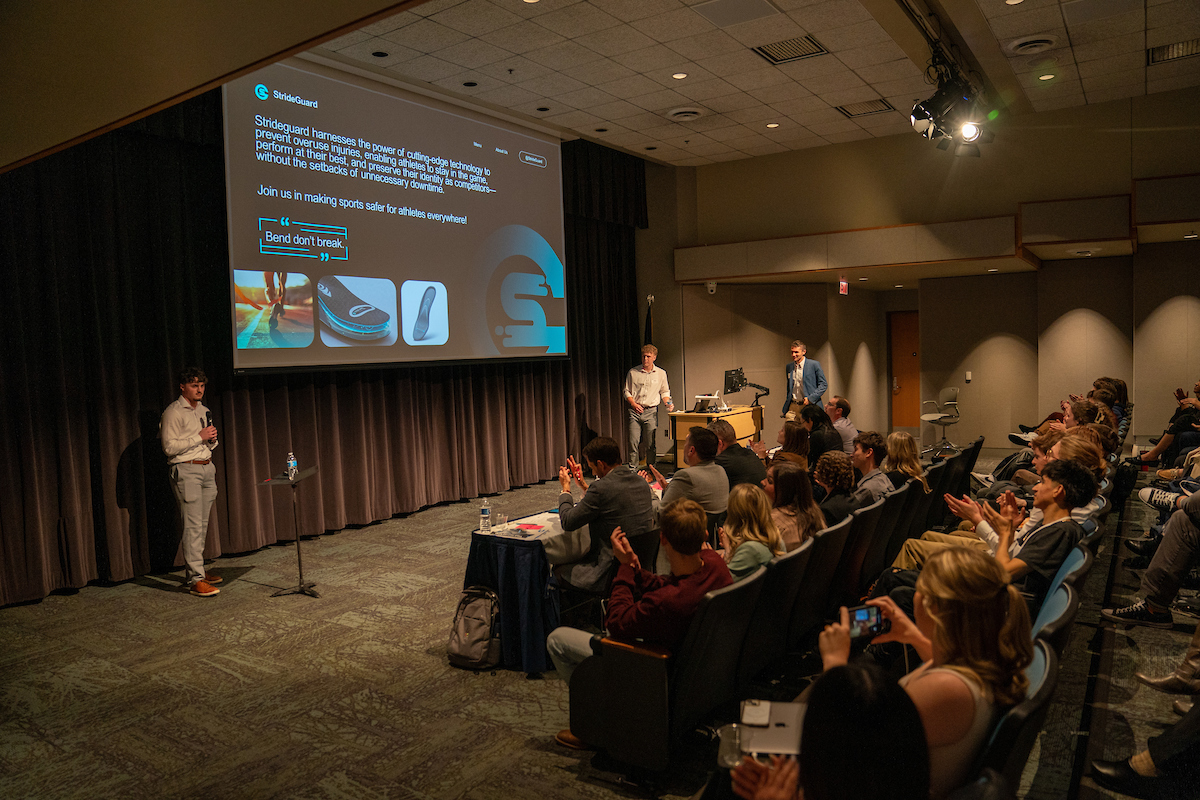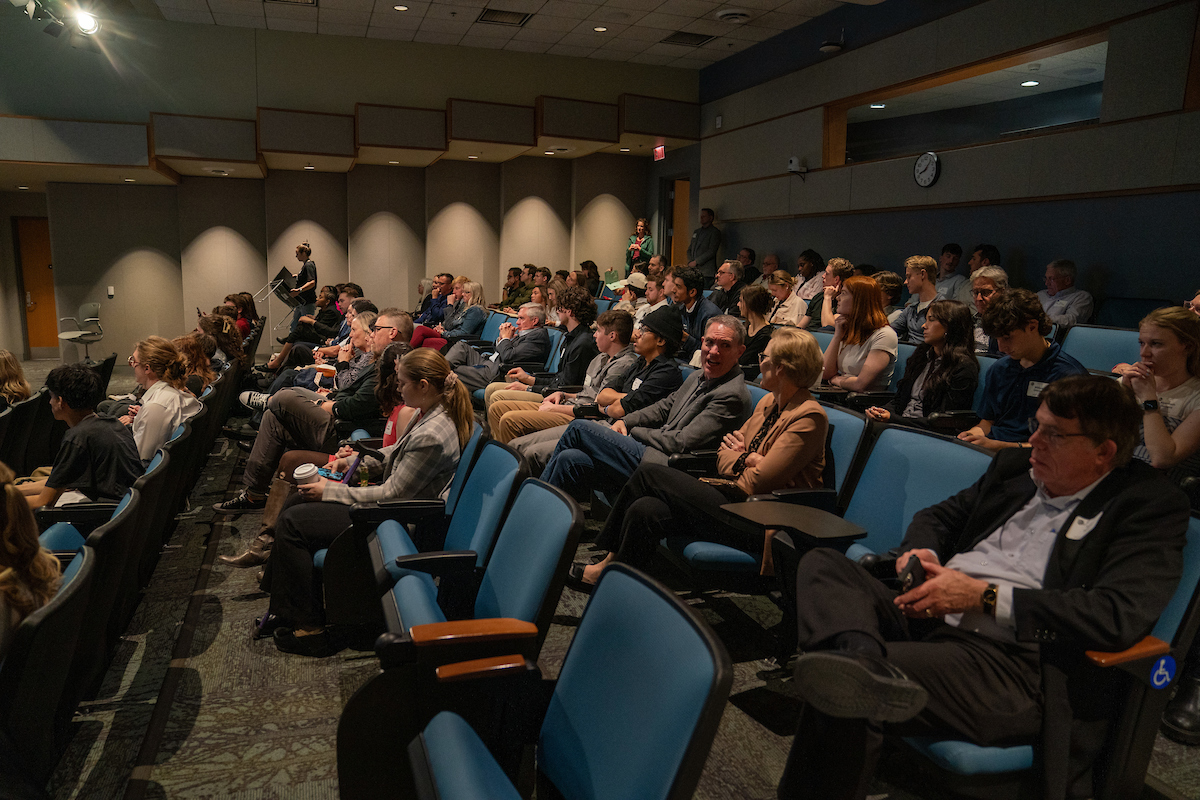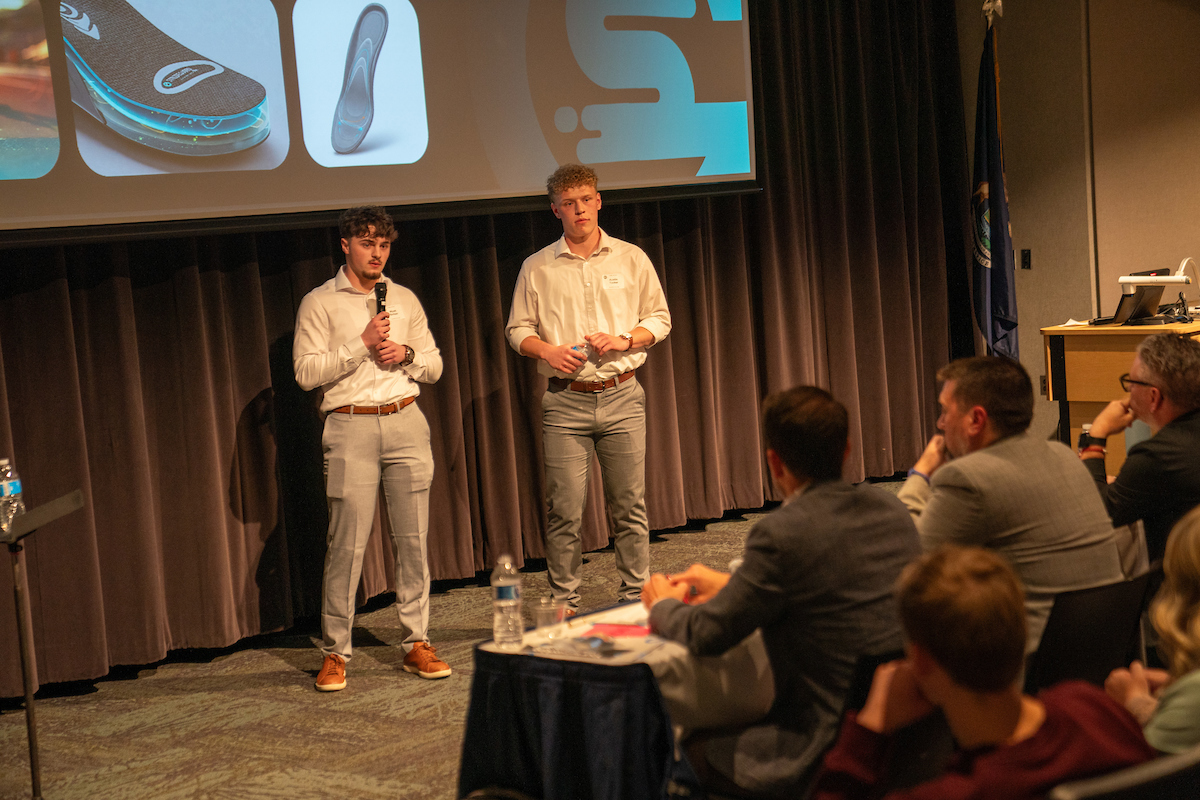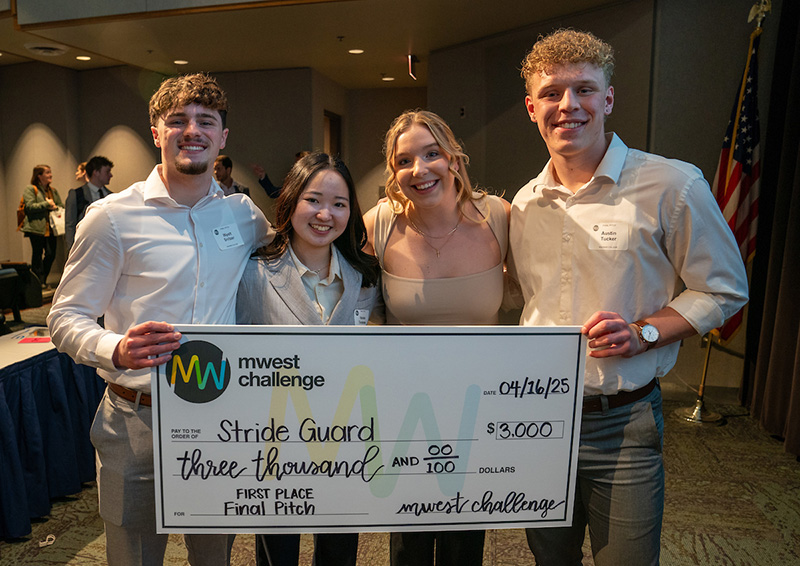This past spring semester, Aquinas students Austin Tucker, Wyatt Snitzer, Haruka Terakawa, and Claire Hines developed Stride Guard, a shoe insert that tracks impacts to help prevent injuries. Their idea won them the $3,000 top prize in the Final Pitch Competition of the MWest Challenge.
This regional competition involves seven West Michigan colleges and universities, represents over 50,000 students, and invites entrepreneurially-minded students to develop new business products, learn how to work as a team, and pitch ideas to the community.
The Stride Guard team credits their genuine passion for the product as the reason for their success.
Stride Guard, the Last-Minute, Winning Idea
The journey began in Professor Felix Pereiro’s entrepreneurship course, as a part of a class project to develop a product or service tackling a real-world problem. Each group pitched their ideas in class, sharpening their skills in timing, delivery, and handling tough questions.
“We started with an idea that we weren’t a big fan of,” explained Austin. “We did the first few assignments and then started to realize it wasn’t a long-term pitch idea. We couldn’t really do it confidently.”
At the time, Wyatt was dealing with frequent, repeated injuries in his leg due to overuse in training. His friends and family told him that he should take it easy, but he continued to push through the pain. “My coaches and teammates were all saying to keep pushing through it,” he relayed, expressing that it can sometimes be difficult to slow down and listen to your body when there’s so much pressure from others.
That’s how he came up with Stride Guard. He wanted a product that could track real data points and prevent overuse and running form injuries. “The idea is an insole with a variety of different trackers,” explains Wyatt. For example, “in your Apple Watch, there are haptic actuator sensors, which can track vitals, and you can also use tactile sensors and pressure sensors to measure overuse.”
After much discussion, the team discovered they had better talking points for Stride Guard, and their professor was more than happy to let them pivot halfway through the class project. Their original idea kept them stuck in the brainstorming phase, but their passion for the new product inspired them to spend extra hours after class to hammer down the details. After the first Aquinas Pitch Night—the qualifying competition that would later grant them entry into the MWest Challenge—the judges shared that this passion was the highlight of their presentation.

Dealing with the Pre-Presentation Jitters
These students expressed how valuable this experience has been. It challenged them to leave their comfort zones when advocating for a product idea. And, while each team member admitted to initially feeling nervous about the presentations, that same passion, coupled with many long evenings of practice, helped them overcome those fears.
 In the lead-up to the second presentation, they practiced their pitch with Professor Mark O’Toole many times. “He fired questions at us, as many as he could think of,” Wyatt recalls.
“So, when it came time for those judges to ask us questions, we were ready.”
In the lead-up to the second presentation, they practiced their pitch with Professor Mark O’Toole many times. “He fired questions at us, as many as he could think of,” Wyatt recalls.
“So, when it came time for those judges to ask us questions, we were ready.”
This exercise helped the team identify Stride Guard’s initial shortcomings, which inspired them to spend more time strengthening their business plan and conducting research. When it came time to present, each student was prepared to answer any potential questions.
Austin explained that once you know your source material well enough to present without cards, and “once you’re confident, it’s literally just a conversation with somebody.”
From Concept to Prototype
The group shared how the feedback they received from their market research also helped them improve the product, not just the presentation. They realized that ideation was only half the battle.
Initially, they reached out to athletes, doctors, and physical therapists to explore how a product like Stride Guard could be valuable across different fields. The idea was that it could “take out the guesswork,” so doctors could see the numbers and better prescribe care for the injured person.
One challenge they encountered was the question of medical data collection legality.
“It’s quite a process,” expressed Austin. “Being able to do it right is really important, and we want that to be one of the cornerstones of the business, that honesty. We’re not selling the data.”
They also discovered that most of their competitors had developed a working prototype. To stay competitive, they knew they needed one too. So, with limited time, they pulled together a “Frankenstein prototype,” creating even more questions. In an effort to find answers and optimize, they reached out to Wes Keely from Spartan Innovations, who became an important mentor. He connected them with GVSU’s engineering program, which helped them build a rough prototype to move the project forward.
Austin recalled that Professor Pereiro, who had been in the room with the judges, expressed that the way their group conducted their research with trained professionals helped them to stand out in the competition.

Takeaways from the Entrepreneurial Experience
Overall, the experience sparked a genuine interest in entrepreneurship in the Stride Guard group, giving them insight into what it takes to build something from the ground up.
Throughout the process, they embraced transparent and honest feedback from one another, which led to stronger collaboration and personal growth. They saw clear development in their communication and leadership skills, and they came to deeply value the process of refining and strengthening their idea.
When asked about her biggest takeaway, Claire replied, “The value of networking. I don’t think I ever really understood how powerful that was until after this competition. There are people out there who want to help young people succeed in something they’re passionate about. The support from the people who came together to guide us through these next steps was really, really important to all of us.”
In this same vein, Wyatt offered some words of encouragement, stating, “I think negative moments are the best moments to come up with business ideas because businesses are always looking to solve a problem. If you have a problem, it’s there to be fixed.”
Moving forward with new confidence and support, Austin shared that the team plans to seek further competitions and funding to bring Stride Guard to market.
